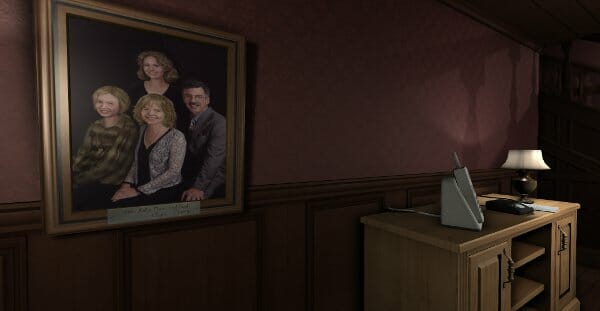Gone Home (PC/Mac/Linux)

If I were to wander through your house while you were out and thumbed through your mail, your medicine cabinet, your closet or your night stand, what story would unfold? What would the notes, the books and the keepsakes scattered throughout say about you, your values, your fears and desires? Few of us would be comfortable allowing someone to do this. Perhaps we feel this way because our possessions tell stories that are often very personal. Gone Home, the first game from the Fullbright Company, sets players loose to explore an old house that a family recently moved into. More than a videogame about voyeurism, Gone Home invites players behind the curtain of a family’s life and in so doing tells one of the most intimate and compelling stories I have experienced.
Gone Home puts us in the shoes of Kaitlyn Greenbriar, a recent high school graduate who returns to her parents’ home after a year long trek through Europe to find the house empty. One of the first things I find is a note from Katie’s sister, Sam, asking Katie not to go snooping around the house trying to figure out where she went. It’s an invitation to be voyeuristic. I’m Katie, and Sam is my sister, so I do what any good sister would and completely disregard Sam’s request. I immediately leap into the role of the voyeur.
Early in the game I discover that the house has a shady past, and that Katie left for Europe before the family inherited the house from a deceased uncle. I also find a frantic, emotional message left for Sam on the family’s answering machine. These discoveries engender an immediate sense of unease, but as I explore what I find is more poignant than any ghost story or murder mystery.
Discovering specific notes, receipts and mementos mysteriously triggers selections from Sam’s diary as I explore the house. “Diary” might not be entirely accurate as Sam’s words are directly addressed to Kaitlyn Greenbriar. These diary entries provide a necessary narrative framework, leaving the player to fill in important gaps in the story through observation of the environment.
Therein lies what makes Gone Home special—it gives us a reason to be curious, and then trusts our curiosity to drive us through the story. The player’s experience is almost entirely self-motivated. There are no objective screens, no prompts telling you what you should do next or warning you that you might be doing it wrong. As Steve Gaynor, co-founder of the Fullbright Company, told Paste during GDC, “if you are playing at all, the only reason is your own inherent curiosity.”
Gone Home’s world is small but dense and packed with realistic details that immediately endear Sam to me. Found objects and the diary segments tell a very personal story. It reminds me of numerous experiences I had growing up and the more I engage with the environment, the more I learn about Sam, her parents and the history of their house. The more I dig, the more Sam tells us about her struggles trying to make friends at a new school, her strained relationship with her parents, and her new but intense love for punk music and riot grrrl culture. (The game even features full songs from Bratmobile and Heavens to Betsy.) Most importantly though I watch Sam’s romantic interest in a rebellious classmate grow into a first love.
-

-

-

-

-

-

-

-

-

-

-

-

-

-

-

-

-

-

-

-

-

-

-

-

-

-

-

-

-

-

-

-

-

-

-

-

-

-

-

-









































